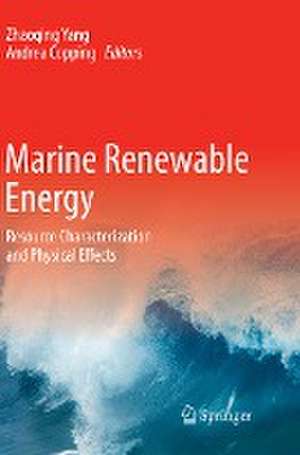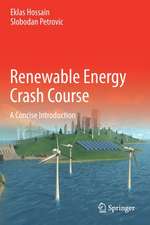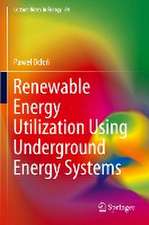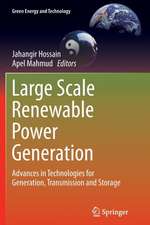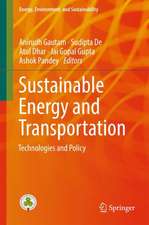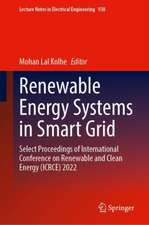Marine Renewable Energy: Resource Characterization and Physical Effects
Editat de Zhaoqing Yang, Andrea Coppingen Limba Engleză Paperback – 25 iul 2018
| Toate formatele și edițiile | Preț | Express |
|---|---|---|
| Paperback (1) | 731.73 lei 6-8 săpt. | |
| Springer International Publishing – 25 iul 2018 | 731.73 lei 6-8 săpt. | |
| Hardback (1) | 1010.17 lei 6-8 săpt. | |
| Springer International Publishing – 19 apr 2017 | 1010.17 lei 6-8 săpt. |
Preț: 731.73 lei
Preț vechi: 892.35 lei
-18% Nou
140.03€ • 145.37$ • 116.76£
Carte tipărită la comandă
Livrare economică 22 martie-05 aprilie
Specificații
ISBN-10: 3319851772
Ilustrații: XIV, 387 p. 144 illus., 135 illus. in color.
Dimensiuni: 155 x 235 mm
Greutate: 0.56 kg
Ediția:Softcover reprint of the original 1st ed. 2017
Editura: Springer International Publishing
Colecția Springer
Locul publicării:Cham, Switzerland
Cuprins
Notă biografică
Dr. Andrea Copping is a Senior Research Scientist and Program Manager at the U.S. Department of Energy’s Pacific Northwest National Laboratory (PNNL) and is a Distinguished Faculty Fellow in the School of Marine and Environmental Affairs at the University of Washington. Dr. Copping’s research focuses on the environmental effects of the development of wave and tidal energy and of offshore wind installations, and on the role that these effects play in technology development and project initiation across the nation. Dr. Copping leads international projects under International Energy Agency agreements on the environmental effects of marine energy development (Annex IV) and of wind (WREN) that share environmental effects information, enabling researchers to benefit from progressmade around the world. Prior to joining PNNL, Dr. Copping was the Associate Director of the Washington Sea Grant Program. Although trained as a blue water biological oceanographer, she has spent most of her career examining the interactions of humans and the marine environment. Her professional involvement includes serving as an Associate Editor of the Coastal Management Journal and on the Editorial Board of the International Journal of Marine Energy. Dr. Copping holds a Ph.D. in Biological Oceanography from the University of Washington.
Textul de pe ultima copertă
Caracteristici
Descriere
This complete reference to marine renewable energy covers aspects of resource characterization and physical effects of harvesting the ocean’s vast and powerful resources—from wave and tidal stream to ocean current energy. Experts in each of these areas contribute their insights to provide a cohesive overview of the marine renewable energy spectrum based on theoretical, numerical modeling, and field-measurement approaches. They provide clear explanations of the underlying physics and mechanics, and give close consideration to practical implementation aspects, including impacts on the physical system. Engineers, researchers, and students alike will find invaluable tools and studies that will aid them in realizing significant sustainable energy production from near-shore and ocean environments.
